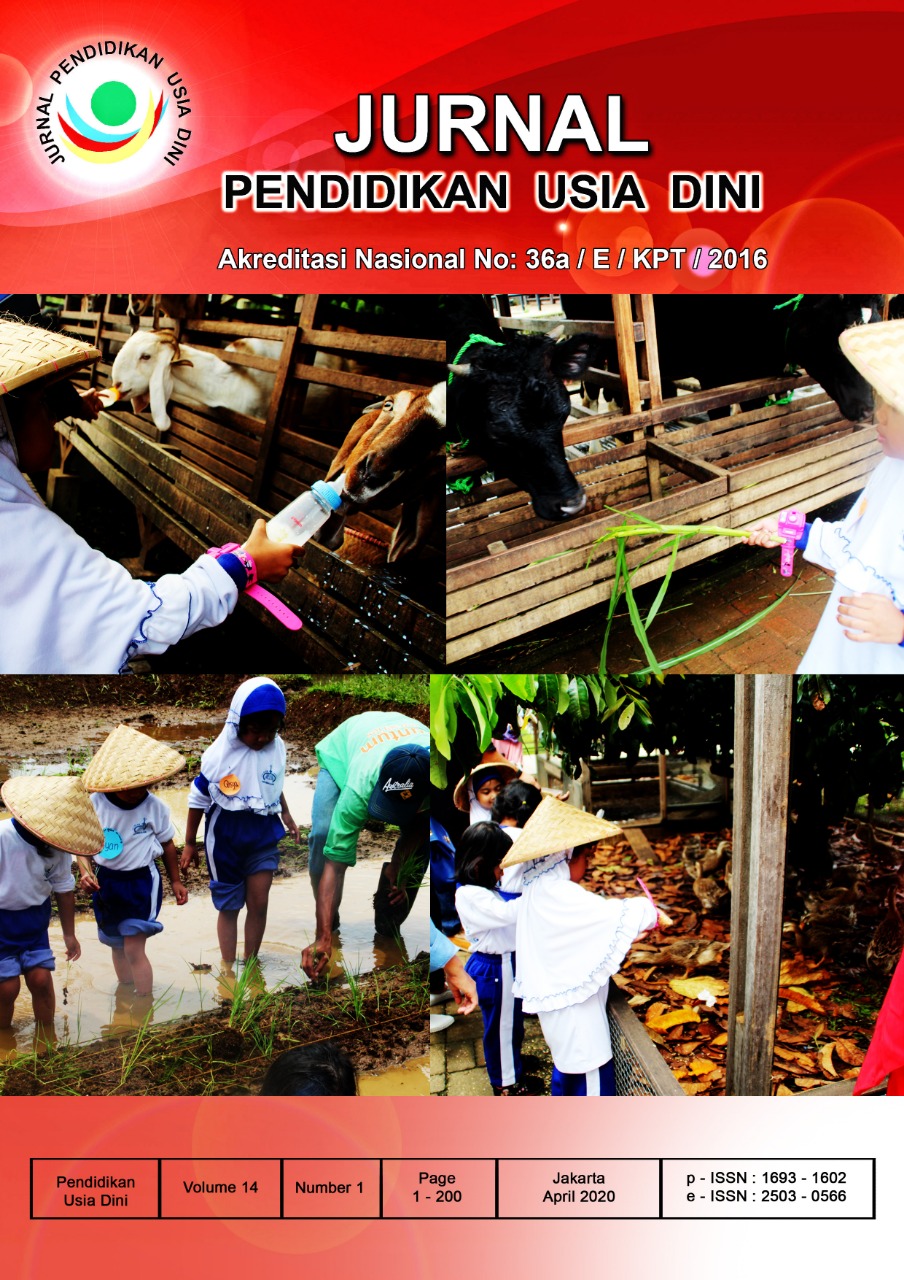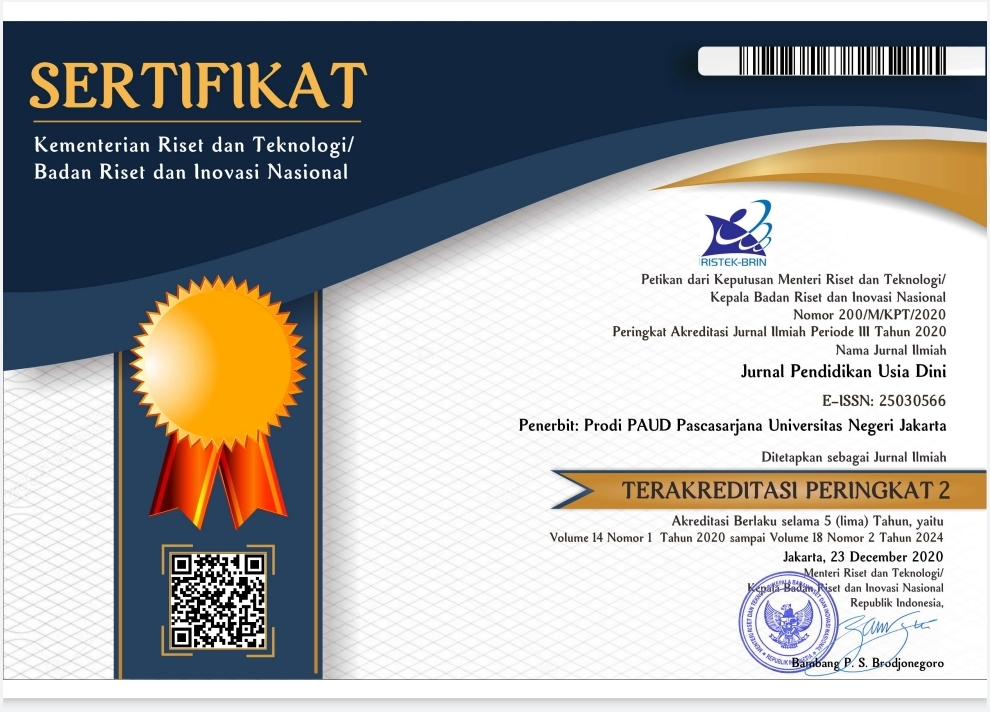Javanese Traditional Songs for Early Childhood Character Education
DOI:
https://doi.org/10.21009/141.12Abstract
Character education in early childhood is not new, and character education is also not just a transfer of knowledge, but something that needs to be built early on through various stimula- tions. This study aims to develop the character of early childhood through audio-visual media with traditional Javanese songs. Using educational design-based research to develop audio-visual media from traditional songs, this media was tested in the field with an experimental design with a control group. Respondents involved 71 kindergarten students from one experimental class in one control class. The data revealed that character education in children shows the average value of the experi- mental class is higher than the control group, this means character education in children can be built through traditional songs. Further research can be done to improve the character of early childhood through a variety of media that interests children.
Keywords: Early Childhood, Character Education, Javanese Traditional Songs Media
References:
Anderson, T., & Shattuck, J. (2012). Design-based research: A decade of progress in education research? Educational Researcher, 41(1), 16–25. https://doi.org/10.3102/0013189X11428813
Bates, A. (2016). The management of ‘emotional labour’ in the corporate re-imagining of primary education in England. International Studies in Sociology of Education, 26(1), 66–81. https://doi.org/10.1080/09620214.2016.1175959
Bates, A. (2019). Character education and the ‘priority of recognition.’ Cambridge Journal of Education, 49(6), 695–710. https://doi.org/10.1080/0305764X.2019.1590529
Battistich, V., Schaps, E., Watson, M., Solomon, D., & Lewis, C. (2000). Effects of the Child Development Project on students’ drug use and other problem behaviors. Journal of Primary Prevention, 21(1), 75–99. https://doi.org/10.1023/A:1007057414994
Berkowitz, M. W. (1933). The Science of Character. The Journal of Philosophy, 30(20), 557. https://doi.org/10.2307/2016365
Berkowitz, M. W., & Bier, M. C. (2004). Research Based Character Education. Annals of the American Academy of Political and Social Science, 591(January), 72–85. https://doi.org/10.1177/0002716203260082
Botvin, G. J., Epstein, J. A., Baker, E., Diaz, T., & Ifill-Williams, M. (2013). School-based drug abuse prevention with inner-city minority youth. The Etiology and Prevention of Drug Abuse Among Minority Youth, 6(I), 5–19. https://doi.org/10.4324/9781315827735-6
Carr, D. (2012). Educating the Virtues: Essay on the philosophical psychology of moral development and education. London: Routledge.
Cobb, J. (2007). What’ll I do with the baby-o? Nursery rhymes, songs, and stories for babies. Vancouver: BC: Blacksheep Press.
Damon, W. (1988). The moral child: Nurturing children’s natural moral growth. New York: Free press.
Derlicki, J. (2005). Ethno-pedagogy - the curse or the cure? The role of the school among youth in Nelemnoe (Yakutia). Sibirica, 4(1), 63–73. https://doi.org/10.1080/13617360500070731
Dick, W., & Carey, L. (2009). The Systematic Design of Instruction. New Jersey: Pearson Education.
Ecclestone, K. (2012). From emotional and psychological well-being to character education: Challenging policy discourses of behavioural science and “vulnerability.” Research Papers in Education, 27(4), 463–480. https://doi.org/10.1080/02671522.2012.690241
Fleer, M., & Hedegaard, M. (2010). Children’s development as participation in everyday practices across different institutions. Mind, Culture, and Activity, 17(2), 149–168. https://doi.org/10.1080/10749030903222760
Goodman, J. F. (2019). Searching for character and the role of schools. Ethics and Education, 14(1), 15–35. https://doi.org/10.1080/17449642.2018.1537989
Greenberg, M. T., Kusche, C. A., Cook, E. T., & Quamma, J. P. (1995). Promoting emotional competence in school-aged children: The effects of the PATHS curriculum. Development and Psychopathology, 7(1), 117–136. https://doi.org/10.1017/S0954579400006374
Hanna, W. (2014). A Reggio-Inspired Music Atelier: Opening the Door Between Visual Arts and Music. Early Childhood Education Journal, 42(4), 287–294. https://doi.org/10.1007/s10643-013-0610-9
Harahap, N., Kahar, I. A., & Nasution, L. H. (2018). Preservation of lullabies songs in forming character based on local wisdom. International Journal of Linguistics, Literature and Culture, 5(1), 32–42. https://doi.org/10.21744/ijllc.v5n1.479
Hariswari, K. P., & Iswidayanti, S. (2019). Catharsis : Journal of Arts Education Gending Rare : Its Potential As A Character Education Media Based on Local Authority in Denpasar City. 8(3), 352–362.
Hariyadi, S., Tamalene, M. N., & Hariyono, A. (2019). Ethnopedagogy of the osing tribe folk song: exploration and formation of biology learning character. Biosfer, 12(2), 258–276. https://doi.org/10.21009/biosferjpb.v12n2.258-276
Hendrix, R. E., Palmer, K. Z., Tashis, N., & Winner, M. G. (2013). The incredible flexible you: A social thinking curriculum for the preschool and the early elementary years. San Jose: CA: Think Social.
Herliyana, & Rosmiati. (2018). Developing the Nationalism Character of Young Learners by Using Songs and Traditional Dances of Indonesia. Proceedings of the International Conference on the Roles of Parents in Shaping Children’s Characters (ICECED), 287–292.
Hidayati, I., Handini, M. C., & Karnadi. (2018). Character education on Dendang saluang ( Traditional song Minangkabau ) in Nagari Saribu Rumah. International Journal of Advanced Education and Research, 3(3), 01–05.
Ilari, B. (2018). Scaramouche Goes to Preschool: The Complex Matrix of Young Children’s Everyday Music. Early Childhood Education Journal, 46(1), 0. https://doi.org/10.1007/s10643-017-0842-1
Jeynes, W. H. (2019). A Meta-Analysis on the Relationship Between Character Education and Student Achievement and Behavioral Outcomes. Education and Urban Society, 51(1), 33–71. https://doi.org/10.1177/0013124517747681
Kotsonis, A. (2020). What can we learn from Plato about intellectual character education? Educational Philosophy and Theory, 52(3), 251–260. https://doi.org/10.1080/00131857.2019.1631157
Kurniawati, Y., Pranoto, S., & Hong, J. J. (2014). Developing Early Childhood’s Character Through Javanesenese Traditional Game. Indonesian Journal of Early Childhood Education Studies, 3(1), 68–72. https://doi.org/10.15294/ijeces.v3i1.9477
Lee, A. (2016). Implementing character education program through music and integrated activities in early childhood settings in Taiwan. International Journal of Music Education, 34(3), 340–351. https://doi.org/10.1177/0255761414563195
Lee, G. L. (2013). Re-emphasizing Character Education in Early Childhood Programs: Korean Children’s Experiences. Childhood Education, 89(5), 315–322. https://doi.org/10.1080/00094056.2013.830907
Lickona, T., Schaps, E., & Lewis, C. (2007). CEP ’ s of Effective Character Education Effective Character Education : Character Education Partnership.
Mang, E. (2005). The referent of children’s early songs. Music Education Research, 7(1), 3–20. https://doi.org/10.1080/14613800500041796
Mans, M. (2002). Playing The Music- Comparing Perfomance of Children’s Song and dance in Traditional and Contemporary Namibian Education. In The Arts in Children’s Live (pp. 71–86). Netherlands: Kluwer Academic Publishers.
Marshall, P. J., Bouquet, C. A., Thomas, A. L., & Shipley, T. F. (2010). Motor contagion in young children: Exploring social influences on perception-action coupling. Neural Networks, 23(8–9), 1017–1025. https://doi.org/10.1016/j.neunet.2010.07.007
MENTERI PENDIDIKAN NASIONAL. STANDAR PENDIDIKAN ANAK USIA DINI. , PERATURAN MENTERI PENDIDIKAN NASIONAL REPUBLIK INDONESIA NOMOR § (2009).
Mullen, G. (2017). More Than Words: Using Nursery Rhymes and Songs to Support Domains of Child Development. Journal of Childhood Studies, 42(2), 42. https://doi.org/10.18357/jcs.v42i2.17841
Mutema, F. (2008). Shona Traditional Children ’ s Games and Play : Songs as Indigenous Ways of Knowing. English, 2(4), 189–203.
Nakashima, D., Prott, L., & Bridgewater, P. (2000). Tapping Into the World’s Wisdom. UNESCO Sources, 1–24.
Nyota, S., & Mapara, J. (2008). Shona Traditional Children ’ s Games and Play : Songs as Indigenous Ways of Knowing. English, 2(4), 189–203.
Rogoff, B., Moore, L., Najafi, B., Dexter, A., Correa-Chávez, M., & Solís, J. (2007). Children’s development of cultural repertoires through participation in everyday routines and practices. Handbook of socialization (In J. E. G). New York: Guilford Press.
Selasih, N. N., & Sudarsana, I. K. (2018). Education Based On Ethnopedagogy In Maintaining And Conserving The Local Wisdom: A Literature Study. Jurnal Ilmiah Peuradeun, 6(2), 293–306.
Sizer, T. R., & Sizer, N. F. (1999). The students are watching: Schools and the moral contract. Boston: Beacon.
Smeyers, P., Smith, R., & Standish, P. (2010). The therapy of education: Philosophy, happiness and personal growth. Basingstoke: Palgrave Macmillan.
Sukoyo, J. (2016). The Development of Javanesenese Songs Containing Character Values as a Learning Medium of Early Childhood Education. Widyaparwa, 44(1), 1–9.
Yang, L. H., Kleinman, A., Link, B. G., Phelan, J. C., Lee, S., & Good, B. (2007). Culture and stigma: Adding moral experience to stigma theory. Social Science and Medicine, 64(7), 1524–1535. https://doi.org/10.1016/j.socscimed.2006.11.013
Zeidler, Dana L; Keefer, M. (2003). the Role of Moral Reasoning on Socioscientific Issues and.
Downloads
Published
How to Cite
Issue
Section
License
JURNAL PENDIDIKAN USIA DINI work is licensed under a Creative Commons Attribution 4.0 International License. (http://creativecommons.org/licenses/by/4.0/)





